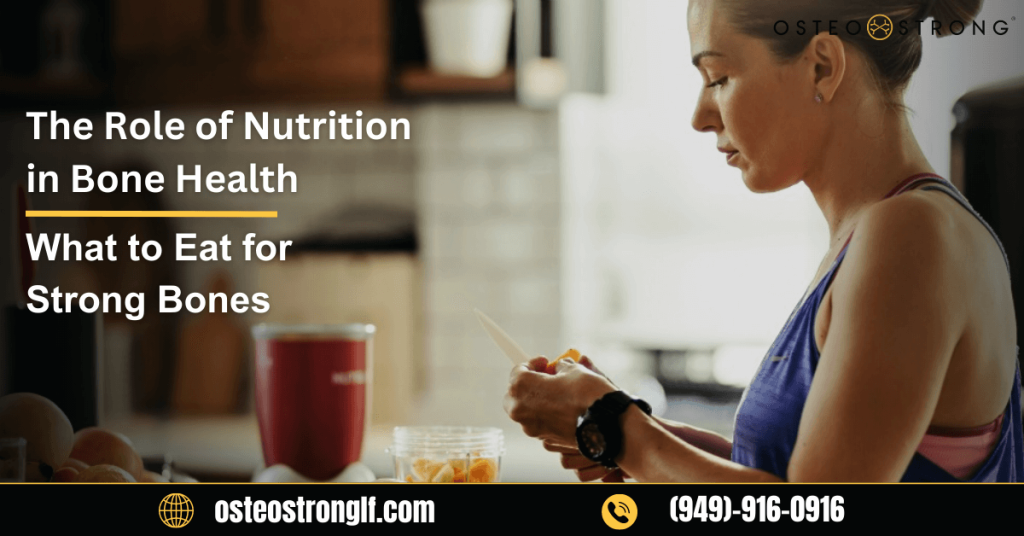
When it comes to maintaining good overall health, we often focus on factors like exercise and sleep, but we may overlook the critical role of nutrition in keeping our bodies strong. One area where nutrition plays a vital role is bone health.
Strong bones are essential for mobility, balance, and preventing conditions like osteoporosis. In this blog post, we will explore the importance of nutrition in maintaining strong bones and discuss the key foods that can promote optimal bone health. So, let’s dive in and discover what you should eat to keep your bones strong and healthy!
Bone Health – The Strength that Starts Within
Before we delve into the role of nutrition, it’s essential to understand the basics of bone health. Bones are living tissues that undergo a constant process of renewal. They are primarily composed of collagen, a protein that provides a framework for bone mineralization. The two key minerals involved in bone health are calcium and phosphorus. Calcium is responsible for maintaining bone strength, while phosphorus supports energy metabolism and the formation of new bone cells.
Throughout our lives, bones continuously undergo a process called remodeling, where old bone tissue is broken down and replaced by new bone tissue. During childhood and adolescence, bone formation outpaces bone breakdown, leading to increased bone density. However, as we age, bone breakdown may start to exceed formation, resulting in a loss of bone density and strength.
How Nutrition Can Impact Bone Health
Before we delve into the specifics of nutrition, let’s briefly understand the basics of bone health. Our bones are composed of a complex matrix of minerals, primarily calcium, and phosphorus, along with collagen and other proteins. Throughout our lives, our bones undergo a continuous process of remodeling, where old bone tissue is broken down and new bone tissue is formed. This dynamic process requires a steady supply of essential nutrients to support bone growth and repair.
A well-balanced diet plays a crucial role in maintaining bone health. It provides the necessary nutrients for optimal bone formation and maintenance. With that in mind, here are some key nutrients that significantly impact bone health:
- Calcium: Calcium is undoubtedly the most well-known nutrient associated with bone health. It plays a crucial role in maintaining bone density and strength. Insufficient calcium intake can lead to a higher risk of fractures and conditions such as osteoporosis. Excellent sources of calcium include dairy products like milk, yogurt, and cheese. If you follow a plant-based diet, you can opt for calcium-fortified alternatives such as soy milk, almond milk, and leafy greens like kale and broccoli..
- Vitamin D: While calcium is essential, its absorption and utilization in the body are greatly influenced by vitamin D. This vitamin aids in the absorption of calcium from the intestines and promotes its incorporation into bone tissue. Natural sources of vitamin D include sunlight exposure, fatty fish like salmon and mackerel, egg yolks, and fortified foods such as cereals and dairy products. If you struggle to get enough sunlight or have limited dietary sources of vitamin D, consult your healthcare provider about potential supplementation.
- Magnesium: Often overshadowed by calcium and vitamin D, magnesium is a vital mineral for bone health. It helps regulate calcium metabolism, stimulates the production of calcitonin (a hormone that preserves bone), and enhances vitamin D activity. Include magnesium-rich foods in your diet, such as nuts, seeds, whole grains, legumes, and leafy green vegetables like spinach.
- Vitamin K: Vitamin K is involved in the production of specific proteins that regulate calcium levels in the body. It helps ensure that calcium is deposited in bones rather than soft tissues, reducing the risk of arterial calcification. Leafy green vegetables such as kale, spinach, and Brussels sprouts, as well as fermented foods like sauerkraut, are excellent sources of vitamin K.
- Protein: Protein is a vital component of bone tissue and is necessary for bone formation and repair. Include lean meats, poultry, fish, eggs, dairy products, legumes, and plant-based protein sources like tofu and tempeh to meet your protein requirements. Aim for a balanced intake of protein throughout the day to support optimal bone health.
Eating The for Right Foods for Stronger Bones
Now that we’ve covered the important nutrients, let’s explore some bone-friendly foods that you can incorporate into your diet:
Dairy Products
Leafy Green Vegetables
Fatty Fish
Fortified Foods
Nuts and Seeds
Beans and Legumes
Whole Grains
Colorful Fruits
Strengthening Your Future with Osteostrong!
Maintaining strong and healthy bones is crucial for our overall well-being. While exercise and other lifestyle factors are important, nutrition plays a fundamental role in supporting optimal bone health. By incorporating calcium-rich foods like dairy products, leafy green vegetables, and fortified foods, along with essential nutrients like vitamin D, magnesium, and vitamin K, you can provide your bones with the nourishment they need.
So, make smart choices when it comes to your diet and invest in the long-term health of your bones. Remember, prevention is key, so start nourishing your bones today for a stronger and healthier future!
What are you waiting for? Schedule your session today!





